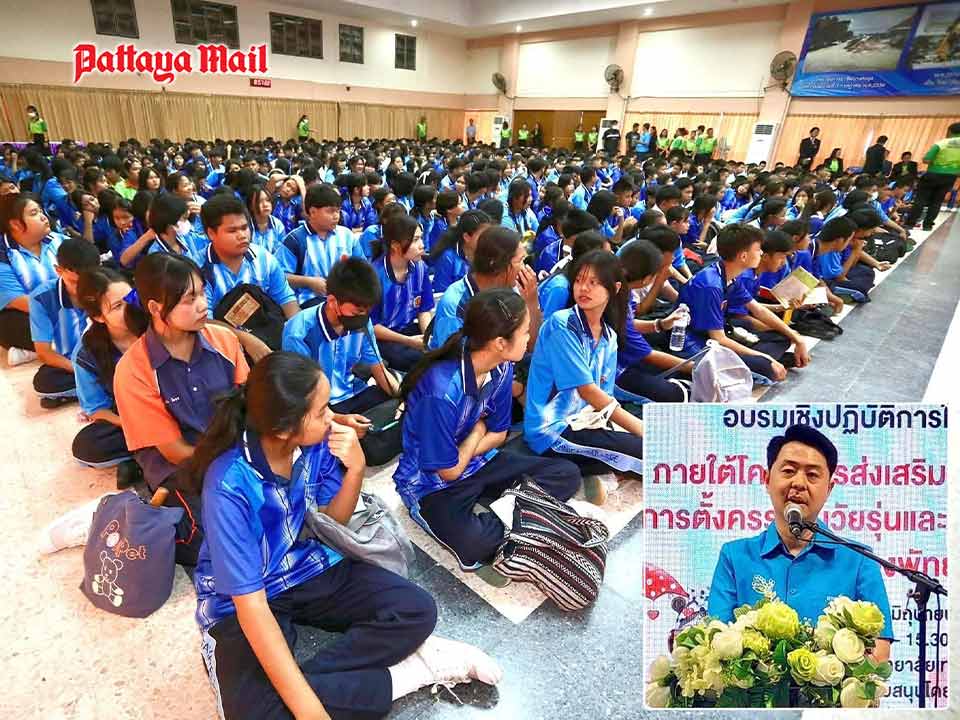Reproductive health and teen pregnancy prevention workshop held in Pattaya – Pattaya Mail


Workshop on Reproductive Health and Adolescent Pregnancy Prevention

PATTAYA, Thailand – On June 5, Mayor Poramet Ngampichet presided over the opening ceremony of a workshop on reproductive health and adolescent pregnancy prevention at Pattaya Technical College. This event was part of a broader initiative to address health risks among Pattaya’s youth.
The Issue of Teenage Pregnancy in Thailand
- Mayor Poramet highlighted the critical issue of teenage pregnancy in Thailand, which poses significant public health challenges including HIV, sexually transmitted infections, risks to new-born health, unsafe abortions, and child abandonment.
- He emphasized that these issues often stemmed from a lack of knowledge and awareness about reproductive health and safe pregnancy prevention among adolescents.
- This was compounded by negative attitudes towards condom use, leading to risky sexual behaviours and inadequate contraception use.
He said, “Key factors contributing to the problem include societal and cultural shifts that increasingly tolerate inappropriate sexual behaviour, a lack of comprehensive sex education in schools, and insufficient resources and guidelines for teaching sex education to both in-school and out-of-school youth. Additionally, there is a generation gap, with teachers and parents often reluctant to discuss sexual issues openly, tending to punish disclosures of sexual activity. This pushes adolescents towards unreliable online sources for information.”
The Workshop Objectives
- The workshop aimed to bridge these gaps by providing accurate information on sexual health, reproductive health, and effective contraceptive methods.
- It also emphasized the need for a supportive environment from families and efficient contraceptive services.
- The program included sessions on proper sexual education, the importance of safe sex practices, and access to youth-friendly sexual health services.
Importance of Health and Hygiene Standards
Mayor Poramet also stressed the importance of adhering to strict health and hygiene standards in the preparation and distribution of school meals, ensuring they were nutritious and met the dietary needs of students. This initiative aimed to foster a healthy environment for students and create a positive image for the school, reassuring parents that their children were well-nourished and cared for.
SDGs, Targets, and Indicators
-
SDG 3: Good Health and Well-being
- Target 3.7: By 2030, ensure universal access to sexual and reproductive health-care services, including for family planning, information, and education, and the integration of reproductive health into national strategies and programs.
- Indicator 3.7.1: Proportion of women of reproductive age (aged 15-49 years) who have their need for family planning satisfied with modern methods.
- Indicator 3.7.2: Adolescent birth rate (aged 10-14 years; aged 15-19 years) per 1,000 women in that age group.
-
SDG 4: Quality Education
- Target 4.7: By 2030, ensure that all learners acquire the knowledge and skills needed to promote sustainable development, including, among others, through education for sustainable development and sustainable lifestyles, human rights, gender equality, promotion of a culture of peace and non-violence, global citizenship, and appreciation of cultural diversity and of culture’s contribution to sustainable development.
- Indicator 4.7.1: Extent to which (i) global citizenship education and (ii) education for sustainable development are mainstreamed in (a) national education policies; (b) curricula; (c) teacher education; and (d) student assessment.
Analysis
The issues highlighted in the article are connected to SDG 3: Good Health and Well-being and SDG 4: Quality Education.
SDG 3: Good Health and Well-being
The article discusses the critical issue of teenage pregnancy in Thailand, which poses significant public health challenges. This aligns with SDG 3, which aims to ensure good health and well-being for all. The article specifically mentions the risks associated with teenage pregnancy, such as HIV, sexually transmitted infections, risks to newborn health, unsafe abortions, and child abandonment. These issues can be addressed by providing reproductive health education and access to contraceptive services.
SDG 4: Quality Education
The article emphasizes the need for comprehensive sex education in schools to address the lack of knowledge and awareness about reproductive health and safe pregnancy prevention among adolescents. This aligns with SDG 4, which aims to ensure inclusive and equitable quality education for all. The article highlights the societal and cultural shifts that contribute to inappropriate sexual behavior and the lack of resources and guidelines for teaching sex education. It also mentions the reliance on unreliable online sources for information. To address these issues, the article promotes proper sexual education, safe sex practices, and access to youth-friendly sexual health services.
Based on the article’s content, the following targets and indicators can be identified:
Target 3.7: By 2030, ensure universal access to sexual and reproductive health-care services, including for family planning, information, and education, and the integration of reproductive health into national strategies and programs.
- Indicator 3.7.1: Proportion of women of reproductive age (aged 15-49 years) who have their need for family planning satisfied with modern methods.
- Indicator 3.7.2: Adolescent birth rate (aged 10-14 years; aged 15-19 years) per 1,000 women in that age group.
Target 4.7: By 2030, ensure that all learners acquire the knowledge and skills needed to promote sustainable development, including, among others, through education for sustainable development and sustainable lifestyles, human rights, gender equality, promotion of a culture of peace and non-violence, global citizenship, and appreciation of cultural diversity and of culture’s contribution to sustainable development.
- Indicator 4.7.1: Extent to which (i) global citizenship education and (ii) education for sustainable development are mainstreamed in (a) national education policies; (b) curricula; (c) teacher education; and (d) student assessment.
Table: SDGs, Targets, and Indicators
| SDGs | Targets | Indicators |
|---|---|---|
| SDG 3: Good Health and Well-being | Target 3.7: By 2030, ensure universal access to sexual and reproductive health-care services, including for family planning, information, and education, and the integration of reproductive health into national strategies and programs. |
|
| SDG 4: Quality Education | Target 4.7: By 2030, ensure that all learners acquire the knowledge and skills needed to promote sustainable development, including, among others, through education for sustainable development and sustainable lifestyles, human rights, gender equality, promotion of a culture of peace and non-violence, global citizenship, and appreciation of cultural diversity and of culture’s contribution to sustainable development. |
|
Copyright: Dive into this article, curated with care by SDG Investors Inc. Our advanced AI technology searches through vast amounts of data to spotlight how we are all moving forward with the Sustainable Development Goals. While we own the rights to this content, we invite you to share it to help spread knowledge and spark action on the SDGs.
Fuente: pattayamail.com

Join us, as fellow seekers of change, on a transformative journey at https://sdgtalks.ai/welcome, where you can become a member and actively contribute to shaping a brighter future.











